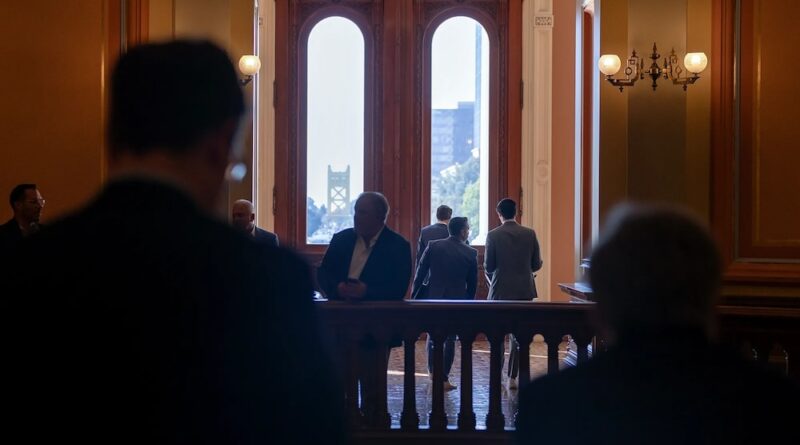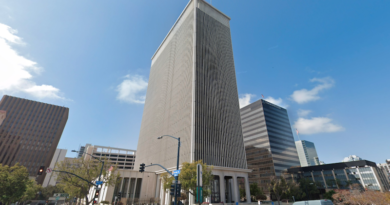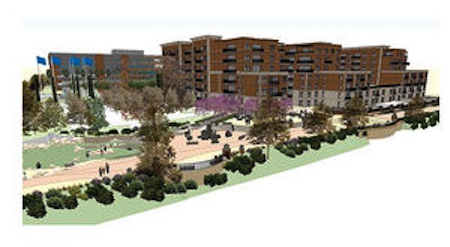Daily Business Report: Jan. 10, 2025
Number of registered lobbyists jumps
to a record high in California
By Sameea Kamal | CalMatters
California saw its biggest increase in registered lobbyists last session since at least 2011, when a change in the law caused the number to more than double.
There was a roughly 10% increase in the number of lobbyists who registered for the 2023-24 session compared to the previous one — for a record of 3,245 people, according to the Secretary of State’s office.
What’s behind the jump? Longtime lobbyist Chris Micheli sees it as the result of high turnover in the Legislature — leading to an “exodus of legislative staff” who went into advocacy.
In what was dubbed the Great Resignation of 2022, for example, 26 members opted out of seeking re-election, in addition to the seven who reached term limits.
Micheli said he has also seen a rise in state agency rule-making, which motivates those in support of or against regulations to lobby: “Some of these regulatory bodies, like the Air Resources Board — the number of regulations that they’re undertaking and their significance has been growing in recent years.”
Meanwhile, the number of legislative staff has shifted only slightly since the mid-1990s, according to data from the National Conference of State Legislatures. The staff count can impact how much time members have to write and research legislation. The increase in lobbyists means there’s now at least one lobbyist for every staff member, compared to two staffers per lobbyist back in 1995, the earliest data available from the Secretary of State’s office.
“The fact that the number of registered lobbyists has risen so high and outstrips the number of actual staffers that legislators have to help them with people’s work shows how skewed our system has become towards the interests of wealthy interests that also dominate campaign spending, rather than regular people,” emailed Trent Lange, executive director of California Clean Money Campaign — an advocacy group that aims to combat the influence of money on politics.
Lobbyists are required to register with the Secretary of State’s office, and report on their activities each quarter. That’s according to the state’s Political Reform Act, which passed in the aftermath of the Watergate scandal in 1974 in an effort to combat political corruption.
Top photo: Advocates and lobbyists in the Capitol Rotunda, during the final day of the 2023 session at the state Capitol in Sacramento on Sept. 14, 2023. (Photo by Rahul Lal for CalMatters)
New study: More than 4.7 million
California residents are food insecure
More than 3.6 million California residents didn’t have enough to eat over two one-week periods in August/September of 2024, 54% more than in August/September of 2021, according to an annual Hunger Atlas Report by the nonprofit group Hunger Free America, based on an analysis of federal data. Hunger Free America attributes this surge in hunger to the expiration of several federal programs, including the expanded Child Tax Credit, increased SNAP (formerly called food stamps) allotments, and universal school meals, coupled with the impact of inflation.
According to the USDA food insecurity data – a different way of measuring food hardship analyzed by Hunger Free America – 4,769,661 California residents (12.4%) were found to live in food-insecure households between 2021 and 2023. This includes 16.7% of children in the state (1,417,137), 9.8% of employed adults (1,810,506), and 8.4% of older California residents (706,389).
Emergency room workers are facing more
attacks. New California law increases penalties
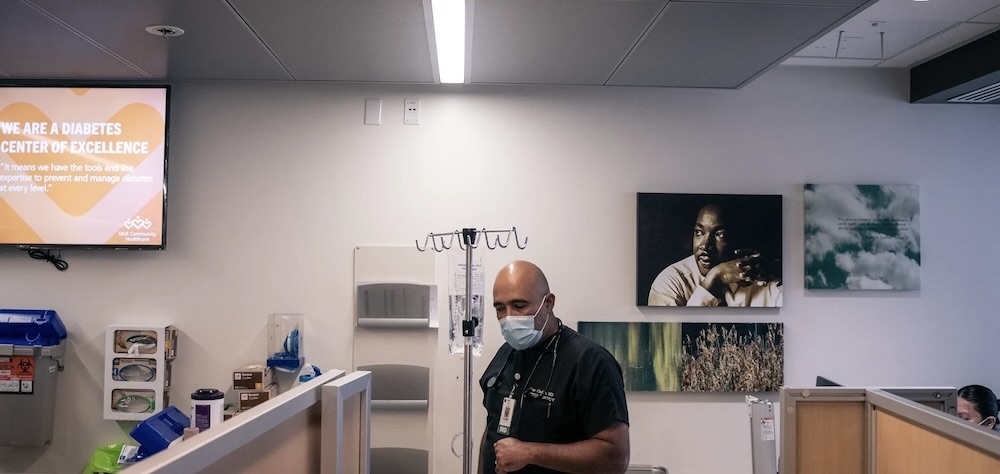
Those who physically attack doctors, nurses and other emergency department workers in California face harsher penalties in 2025 thanks to a new law. In September, Gov. Gavin Newsom signed Assembly Bill 977, which increased penalties from six months to a year in jail for those convicted of assaulting California’s hospital emergency room workers.
The bill’s author was Assemblymember Freddie Rodriguez, who spent 30 years as an emergency medical technician in the San Gabriel Valley.
Oscar Casillas, the medical director of emergency medicine at Martin Luther King Jr. Community Hospital in Los Angeles, checks in on patients inside tiny cubicles that are used for treatment, on July 26, 2022. (Photo by Pablo Unzueta for CalMatters)
Most medical debt can no longer hurt your credit score
Every day people across the country skip medical care because of cost. Those who do seek medical help may end up with a balance they can’t pay off. That debt can hurt people’s credit scores, resulting in long-term financial burdens. Starting Jan. 1, a new state law will prohibit health providers and debt collectors from reporting medical debt information to credit agencies. That means unpaid medical bills should no longer show up on people’s credit reports, which consumer advocacy groups say is a boon for patients with debt.
California limits junk fees: New law blocks
fines for declined ATM withdrawals
Californians who try to withdraw money but don’t have enough in their bank accounts won’t fall deeper into a financial hole from having to pay a fine, thanks to a new state law.
The law covers instances in which banks charge customers when their withdrawals are declined instantaneously, such as at ATMs, because of insufficient funds. It takes effect Jan. 1. Assembly Bill 2017 applies to banks and credit unions that are regulated by the state; Gov. Gavin Newsom signed it in September. The bill was backed by several consumer advocacy groups, including the California Low-Income Consumer Coalition and East Bay Community Law Center, which called penalties for insufficient funds “junk fees” and said getting rid of them will protect financially vulnerable consumers.
San Diego Supercomputer Center receives honors
in 2024 BigDATAwire Readers’ and Editors’ Choice Awards
The San Diego Supercomputer Center (SDSC) in the School of Computing, Information and Data Sciences at UC San Diego, along with the University of Utah, has been recognized in the Ninth Annual BigDATAwire Readers’ and Editors’ Choice Awards for leadership in the National Data Platform (NDP). SDSC was recognized with the following honor:
Editors’ Choice: Top 3 Big Data and AI Open Source Projects to Watch
National Data Platform
SDSC and Scientific Computing and Imaging Institute at the University of Utah launched the $6 million U.S. National Science Foundation-funded NDP to create an equitable data ecosystem. The initiative aims to enhance access to open data, fostering innovation and collaboration while addressing global challenges like climate change through AI-integrated solutions.
Cal State San Marcos wins National Diversity Award
Cal State San Marcos has received the 2024 Higher Education Excellence in Diversity (HEED) Award from Insight Into Diversity magazine, the oldest and largest diversity-focused publication in higher education. As a recipient of the annual HEED Award — a national honor recognizing U.S. colleges and universities that demonstrate an outstanding commitment to diversity and inclusion — CSUSM will be featured along with 113 other recipients in the November/December 2024 issue of Insight Into Diversity magazine.
Assessor’s chief of staff appointed to national board to represent counties
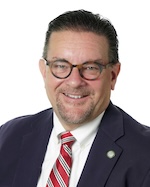
Timothy Boncoskey, chief of staff, San Diego County Assessor-Recorder-County Clerk (ARCC), has been appointed to the National Association of Counties (NACo) board of directors. NACo is national trade group representing 40,000 county elected officials and 3.6 million county employees. Its mission is to strengthen America’s counties. Boncoskey is the only NACo board member from San Diego County and one of seven NACo board members from California. On the NACo board, Boncoskey will represent the International Association of Assessing Officers (IAAO). With more than 8,000 members, IAAO, an educational and research nonprofit founded in 1934, sets best practice standards for appraisal and property tax policy.
Boncoskey oversees operations and strategy for the ARCC with a staff of over 450 and an annual budget of over $90 million. He is a certified property tax appraiser in California, a credentialed member of the Chief of Staff Association and an affiliated member of the International City-County Management Association.
The County’s ARCC is the fifth largest Assessor jurisdiction in the U.S. The ARCC office oversees assessing the value of real estate and personal property, which includes aircraft and boats. For information, visit www.sdarcc.gov.

